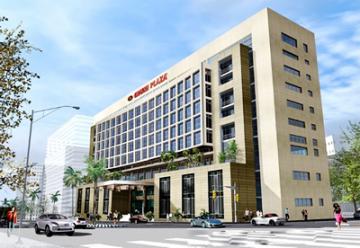Sub Saharan growth drives African hotel surge
 InterContinental Hotels Group (IHG) signed a management agreement with Tsemex Hotels and Business Plc to develop Crowne Plaza Addis Ababa scheduled to open in 2016.
InterContinental Hotels Group (IHG) signed a management agreement with Tsemex Hotels and Business Plc to develop Crowne Plaza Addis Ababa scheduled to open in 2016.
Appetite for hotel development in Africa is increasing with many more businesses setting up offices or doing deals on the continent.
From the Ivory Coast to Ghana, Gabon, Ethiopia and Kenya, a surge of pending and planned hotel openings in Sub-Saharan Africa is riding the continent’s wave of economic growth and political stability.
This is despite the Ebola crisis having been misinterpreted to be spreading across the continent. Many tourists from Asia and Europe had cancelled their flights and avoided trips to Africa in fear of catching the disease.
The development pipeline for hotels in Africa has grown by 25 percent to 270 hotels from 215 last year.
Analysts say that sub Saharan African countries are performing well as tourist destinations as opposed to further north where countries have enjoyed hotel industries for longer.
In an interview with Africa Property News.com, Xander Nijnens the Head of Hotels, Sub-Saharan Africa at Jones Lang Lasalle says that sub Saharan Africa is enjoying more growth activity than further north as the hotel industry in Northern Africa is far more developed.
"Hotel developments tend to follow economic activity in strong growing economies. So we see hotel rollouts in the like of Ethiopia, Kenya, Nigeria and then South Africa," he said.
There was a modest recovery in the hotel development pipeline in north Africa this year to 79 hotels providing 18 565 rooms from the 73 hotels providing 16 449 rooms last year, according to data from the latest hotel chain development pipeline survey produced by W Hospitality Group.
The survey explained that 270 hotel pipeline included nearly 50,000 rooms. Sub-Saharan Africa exceeded North Africa by almost 70%. The survey showed that there had been a recovery in North Africa.
Nijnens says that Sub Saharan Africa is gaining momentum.
“Sub-Saharan Africa is gathering hotel development momentum but it is growing off a lower base than North Africa which has a longer history of having a sizeable and established tourism industry,” he says.
W Hospitality Group's survey was based on contributions from 37 international hotel chains with 80 brands between them.
The Sub Saharan Africa region also had far more national markets than North Africa, 49 countries compared with five.
Many of the Sub Saharan African hotels were also non-branded in the past.
As a sub-region, West Africa remains the place with by far the greatest number of rooms in the overall pipeline, more than double that of East Africa. This is because Nigeria is finally seeing a roll-out of hotel developments. Nigeria is the largest economy on the continent after its gross domestic product figures last year.
Various companies which are trying to open businesses in Nigeria are finding they have to go on many trips as the markets there take long time to get information about and to understand. Companies do not always know how many meetings could be required for each project.
“Demand for hotels in Sub-Saharan Africa is boosted by many multinationals that are servicing markets on a fly in and fly out basis prior to opening their local offices,” Nijnens says.
Nijnens says it is important to distinguish between deals which are still in the planning stage and those which are close to reality, with construction started. Sub-Saharan Africa has many more signed deals than North Africa, but the latter has 78 per cent of the pipeline rooms on site, compared to 55 per cent in Sub Saharan Africa.
Trevor Ward, MD at W Hospitality Group says the opportunities in Africa are massive and that competition should increase across 2015 and 2016.
“What we’re seeing now is growing confidence right across Africa, including recognition that there are opportunities beyond North Africa which can, and must, be exploited. Several of the international hotel chains have established local development offices, the newest being Hyatt in Nairobi and the chains are more serious than ever about building their businesses below the equator," he said.
Matthew Weihs, MD for Bench Events, the organiser of the Africa Hotel Investment Forum, which attracts all the major international hotel investors in Africa, where the W Hospitality Group's survey will be discussed in detail, said: “Africa is becoming an increasingly attractive place to do business. There is much less conflict and political unrest than a decade ago; continent-wide economic growth is around 5% and that is forecast to continue, national economies are becoming less reliant on natural resources and many countries have taken steps to become more business friendly and to attract international investment. As we can see from this fascinating report, those strategies are paying off handsomely.”
While the large and upper market hotel brands such as The Hilton and Carlson Rezidor dominate the new hotel pipeline, some experts believe that more mid-range hotels are needed.
Audit, advisory and consulting company, Grant Thornton believes there is a gap for mid-range hotel and budget chains on the African continent. Gillian Saunders, the company’s global leader for Hospitality and Tourism has said that hotel developers and operators have tended to miss the opportunity to serve a large intra-continental business market that is hungry for known brands.
“When business travellers go to countries they don’t know very well, they look for reasonably-priced hotels that they recognise. They trust the brands, however these can be hard to find," she says.
Most Popular
Watch: A Credible Market, the need for Standards in Property Industry
Valuation standards have a significant role to play in helping to regulate professional practice at national, regional and global levels, promoting professional ethics, integrity, impartiality and trust in valuer activities in the property industry. ... Full story











